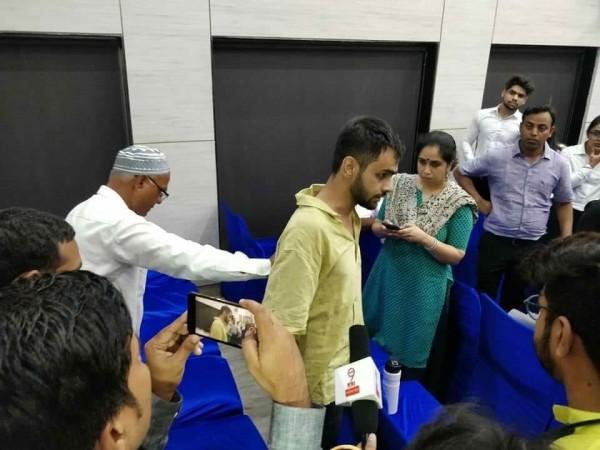It was only last month that Patiala House Court's Chief Metropolitan Magistrate Pankaj Sharma had directed the jail authorities to produce Umar Khalid "in a routine manner without using handcuffs or fetters."
Yet, Khalid, the JNU student-activist accused in a UAPA case filed in connection with Northeast Delhi riots, was brought to Delhi's Karkardooma Court in handcuffs on Thursday, despite a court order asking the police to refrain from doing so.
The Court, has now issued a notice to the Director General (Prisons) seeking explanation whether prison authorities had passed the orders to handcuff Khalid. Khalid was produced in the courtroom of Judge Amitabh Rawat, who was on leave in the morning. But the reader of the court noted the presence of counsels and accused persons and there was no production before any judicial officer.

ASJ Rawat passed the order in the evening after Khalid's lawyer, senior advocate Trideep Pais, informed him that Khalid was produced in handcuffs by the police, despite there being no such order from this court and in violation of two contrary orders passed by two separate courts. Pais told the court that this was a, "violation of the rights of the accused and inquiry must be conducted to find fault with the delinquent police officials."
In his order Additional Sessions Judge Rawat stated that, "it needs no reiteration that an undertrial remains in custody of the court throughout the proceedings and any step of fetters/handcuff which are extreme steps, can only be taken after a court allows the same on a request or an application containing reasons. This court has passed no such orders for this accused or, for that matter, any accused in this case."
ASJ Rawat also said he, "deems it fit to bring the lapses if any, to the notice of the Commissioner of Police, Delhi, who may file a report after inquiry through any responsible senior officer whether the accused Umar Khalid was brought in handcuffs today, and if so, on what grounds/orders."
June order stated the same
In June of last year, an order was passed by ASJ Vinod Yadav, dismissing an application on behalf of the lock-up-in-charge seeking to produce the accused in handcuffs as they were, "high-risk prisoners." Calling the application devoid of merit and any reasonable ground, ASJ Yadav noted in the order that Umar and Khalid Saifi were, "not previous convicts. They are not even gangsters."

A senior police officer with the Delhi Prisons Department said that a fact-finding enquiry will be conducted to find out the truth. "We are checking if he was really handcuffed." In the meanwhile, an officer from the Special Cell also said they were trying to find out as to why he was brought in handcuffs. When reached out, several senior officers from the Special Cell investigating Khalid's case refused to comment on the matter.
Reckless handcuffing
Once upon a time, a popular practice and now a discouraged one, use of handcuffs has been restricted by directives of the Indian Supreme Court. Now the law enforcement agencies need to seek court's permission before handcuffing a person. In Sunil Batra Vs Delhi Administration (1978), the Supreme Court held that handcuffing a person was in violation of Article 21 of the Constitution. It said that it deprived a person of their personal liberty.
"The indiscriminate resort to handcuffs when accused persons are taken to and from court and the expedient of forcing irons on prison inmates are illegal and shall be stopped forthwith save in a small category of cases. Reckless handcuffing and chaining in public degrades, puts to shame finer sensibilities and is a slur on our culture," it said. Unwarranted use of iron fetters or handcuffs is a violation of basic human rights and Supreme Court has in several instances directed that the escorting officer cannot chain an inmate at their whims or fancies.
#UmarKhalid to be produced in court today The fighting spirit, the courage this man has is just commendable. Can't believe after losing valuable years of his life he still haven't bowed down to the fascists. Remember him in your Dua?#FreeAllPoliticalPrisoners pic.twitter.com/cYV9hh2bS2
— Harun khan هارون خان (@iamharunkhan) February 17, 2022

















